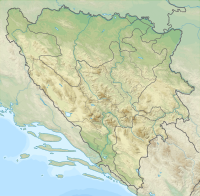 | ||
| Tuzla | ||
| entity | Federation of Bosnia and Herzegovina | |
|---|---|---|
| Residents | 110.979 (2013) | |
| height | 245 m | |
| no tourist info on Wikidata: | ||
| location | ||
| ||
Tuzla is the third largest city in Bosnia and Herzegovina and is located in the northeast of the country.
background
The capital of the canton of the same name is known as a major industrial location, and the coal-fired power plants at the gates are said to be distinctive. The Jala flows through the city.
During the war in the 1990s there was a massacre that left deep wounds. Nevertheless, the city is considered very open.
getting there
By plane
The city has its own Tuzla airport(IATA: TZL), which is about 15 km south of the city center. There are flights to and from, among other things Dortmund![]() (IATA: DTM) .
(IATA: DTM) .
By train
Since the city has a terminus, there is only one route. This connects Tuzla with Doboj. Doboj is straight from the capital Sarajevo or over Dobrljin from the Croatian capital Zagreb reachable.
By bus
The approximately 200 km long route from Belgrade the bus to Tuzla takes three to four hours and is sometimes served without a stop.
In the street
mobility
Tourist Attractions
activities
In an old marshland there was a salt lake laid out for the urban population as a replacement for the distant Adriatic should serve.
shop
kitchen
nightlife
accommodation
Learn
Work
security
health
Tuzla is at the forefront of the cities in Europe most heavily polluted by particulate matter. The EU limit values are exceeded here many times over. Emergency clinics for smog patients are set up in winter, and the lung cancer rate is well above the European average. A pungent smell of burnt coal is omnipresent, especially when it gets cooler and is heated. Tragically, the problem that gets worse year after year is hushed up or marginalized by politics. The months of June and July are the least burdened on an annual average compared to the rest of the year. Here, the current health risk from fine dust can be checked or compared with measured values from other cities:
http://aqicn.org/map/world/de/#@g/0.4535/156.0938/0z
Practical advice
The taxi prices here are considered cheap, but only if the taxi driver has a taximeter and turns it on. So the amounts can be quite different.
The official price list of tuzlataxi.com proclaimed:
- 6:00 a.m. - 11:00 p.m. from 3.00 KM, the equivalent of 1.50 euros (up to 4 km)
- 11:00 p.m. - 6:00 a.m. 5.00 KM, equivalent to 3 euros (up to 6 km)
trips
literature
- : The man who brought the sea. In:TIME online, Thursday July 30, 2015.
Web links
- http://www.tuzla.ba - Official website of Tuzla



